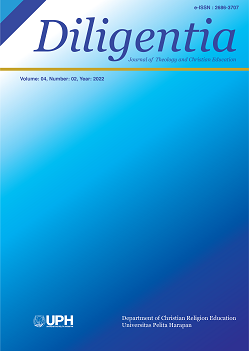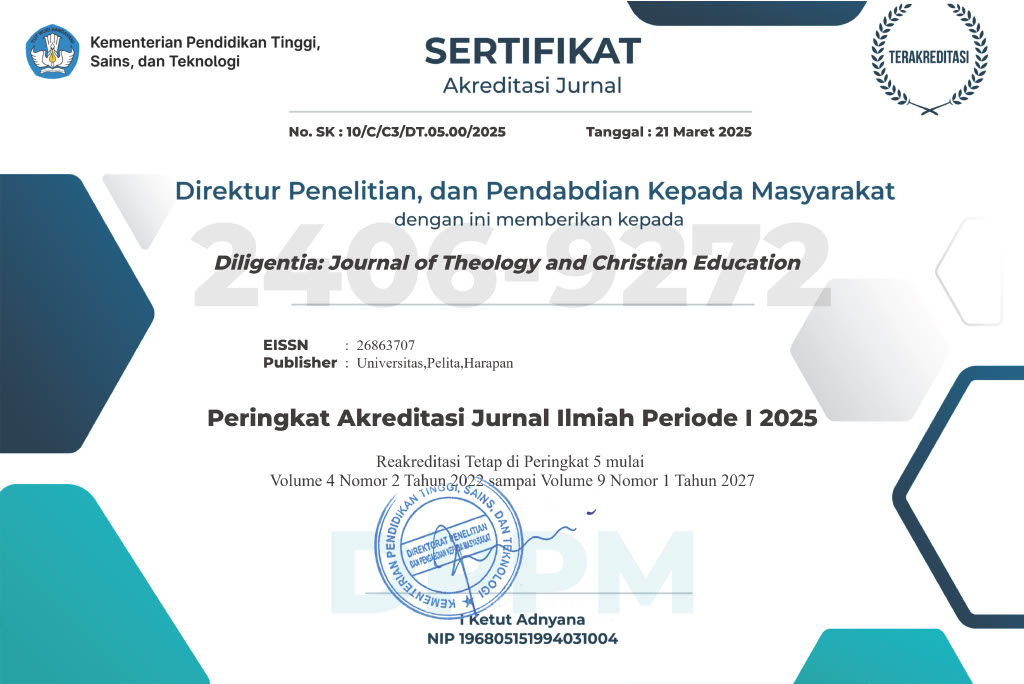Kajian Aksiologi Terhadap Fungsi Profesionalitas Guru Dalam Pembentukan Karakter Siswa Pada Pembelajaran Daring [An Axiology Review on the Function of Teachers' Professionality in Building the Students' Character During Online Learning]
DOI:
https://doi.org/10.19166/dil.v4i1.4736Schlagworte:
Online Learning, Student Character, Professional TeacherAbstract
Online learning is a learning method which conducted during the Covid-19 pandemic and focuses on students as active learners. As human, students are image of God yet fallen into sin, which makes them create the understanding of good and bad. Therefore, teachers need teacher’s professionalism to guide students, who have problems character during online learning, to stay on the right path and grow. The purpose of this paper is to see the role of teacher professionalism in shaping the character of students to interpret Christian education in online learning. The method used in this paper is a literature review. Teachers can carry out character building with the Pancasila profile framework and focus on the character of Christ. This can be achieved by delivering learning materials referring to the profile of Pancasila students and the character of Christ in the lesson plans by preparing biblical Christian worldview which carried out professionally. The professional attitude of teachers in carrying out their duties and responsibilities in the classroom helps the learning process run well by fulfilling the focus in cognitive, affective, and psychomotor.
Literaturhinweise
Anugrahana, Andri. “Hambatan, Solusi Dan Harapan: Pembelajaran Daring Selama Masa Pandemi Covid-19 Oleh Guru Sekolah Dasar.” Scholaria: Jurnal Pendidikan dan Kebudayaan 10, no. 3 (2020): 282-89. https://doi.org/10.24246/j.js.2020.v10.i3.p282-289
Bavinck, Herman. Reformed Dogmatics: Abridged in One Volume. Edited by John Bolt. Grand Rapids, MI: Baker Academic, 2011.
Bavinck, Herman. Reformed Dogmatics Volume 3: Sin and Salvation in Christ. Grand Rapids, MI: Baker Academic, 2006.
Van Brummelen, Harro. Batu Loncatan Kurikulum: Berdasarkan Alkitab. Tangerang, Indonesia: Universitas Pelita Harapan Press, 2008.
Van Brummelen, Harro. Berjalan Dengan Tuhan Di Dalam Kelas : Pendekatan Kristiani Untuk Pembelajaran. Tangerang, Indonesia: Universitas Pelita Harapan Press, 2009.
Cahyadi, Iman Rahman. “Survei KIC: Hampir 60% Orang Indonesia Terpapar Hoax Saat Mengakses Internet.” Berita Satu, 2020. https://www.beritasatu.com/digital/700917/survei-kic-hampir-60-orang-indonesia-terpapar-hoax-saat-mengakses-internet.
Calvin, Yohanes. Institutio: Pengajaran Agama Kristen. Jakarta, Indonesia: BPK Gunung Mulia, 2000.
Dharmawan, Sofyan Setyo. “Sekolah Daring Jadikan Anak Malas,” 2020. https://respons.id/sekolah-daring-jadikan-anak-malas/.
Dja’far, Suhermanto. “Manusia dalam Perspektif Metafisika dan Islam.” Universitas Islam Negeri Sunan Ampel, 2013. http://digilib.uinsby.ac.id/id/eprint/905.
Erickson, Millard J. Christian Theology. 3rd ed. Grand Rapids, MI: Baker Book House Company, 1985.
Fahruni, Findivia Egga Wiryosutomo, Hadi Warsito. “Analisis Faktor-Faktor Penyebab Perilaku Malas Belajar Daring Saat Pandemi Covid-19 Pada Siswa Kelas Xii Sma Negeri 1 Menganti Gresik.” Jurnal BK UNESA 12, no. 2 (2021): 22-36.
Foundation, Tanoto. “Survei Pemetaan dan Rekomendasi.” Jakarta, 2020. https://www.pintar.tanotofoundation.org/survei-pemetaan-dan-rekomendasi-bdr-yang-bermakna.
Grudem, Wayne. Theology : An Introduction to Bible Doctrine. Grand Rapids, MI: InterVarsity Press, 2000.
Hamzah, Syeh Hawib. “Aspek Pengembangan Peserta Didik: Kognitif, Afektif, Psikomotorik.” Dinamika Ilmu 12, no. 1 (2012): 1-22.
Hanarini, Oktafia Ika, and Siti Sri Wulandari. “Pembelajaran Daring Sebagai Upaya Study From Home (SFH) Selama Pandemi Covid 19.” Jurnal Pendidikan Administrasi Perkantoran (JPAP) 8 (2020): 496-503. https://journal.unesa.ac.id/index.php/jpap.
Hoekema, Anthony A. Manusia : Ciptaan Menurut Gambar Allah. Jakarta, Indonesia: Momentum, 2008.
Kemendikbud. “Dampak Negatif Satu Tahun PJJ, Dorongan Pembelajaran Tatap Muka Menguat,” 2021. https://www.kemdikbud.go.id/main/blog/2021/04/dampak-negatif-satu-tahun-pjj-dorongan-pembelajaran-tatap-muka-menguat.
Mahrani, Nana, Anton Ritonga, Misri Kholidah Hasibuan, and Sukhron Efendi Harahap. “Analisis Sisi Negatif Moralitas Siswa Pada Masa Pembelajaran Jarak Jauh.” THORIQOTUNA: Jurnal Pendidikan Islam 3, no. 1 (2020): 56-63. https://doi.org/10.47971/tjpi.v3i1.227
Mungkasa, Oswar. “Bekerja Dari Rumah (Working From Home/WFH): Menuju Tatanan Baru Era Pandemi COVID 19.” Jurnal Perencanaan Pembangunan: The Indonesian Journal of Development Planning 4, no. 2 (2020): 126-50. https://doi.org/10.36574/jpp.v4i2.119
Padmadewi, Ni Nyoman, and Luh Putu Artini. Literasi Di Sekolah, Dari Teori Ke Praktik. Edited by Narayana Prasada. 1st ed. Badung, Indonesia: Nilacakra, 2018.
Rahayu, Wilujeng. “Manajemen Diri.” An-Nuha 17, no. 1 (2019): 79-90. https://doi.org/10.35719/alhikmah.v17i1.8
Rose Publishing. Attributes of God. Peabody, MA: Rose Publishing, 2014.
Setiawani, Mary, and Stephen Tong. Seni Membentuk Karakter Kristen. Jakarta, Indonesia: LRII, 1995.
Snijders, Adelbert. Antropologi Filsafat Manusia: Paradoks Dan Seruan. Sleman, Indonesia: Kanisius, 2004.
Sugiarti, Yuni. “Peranan Teknologi Internet Dalam Membangun Pendidikan Karakter Anak.” Teknodik XV, no. 2 (2011): 145-54.
Sulianta, Feri. “Buku Literasi Digital, Riset dan Perkembangannya dalam Perspektif Social Studies.” Universitas Pendidikan Indonesia, no. June (2020): 81-82. https://www.researchgate.net/publication/341990674_Buku_Literasi_Digital_Riset_dan_Perkembangannya_dalam_Perspektif_Social_Studies_oleh_Feri_Sulianta.
Suwardani, Ni Putu. “Quo Vadis” Pendidikan Karakter Dalam Merajut Harapan Bangsa Yang Bermanfaat. Denpasar, Indonesia: UNHI Press, 2020.
Tong, Stephen. Arsitek Jiwa I. 7th ed. Surabaya, Indonesia: Momentum, 2008.
Varatta, Katie. “Teacher-Centered Versus Learner-Centered Learning.” KnowledgeWorks, 2017. https://knowledgeworks.org/resources/learner-centered-learning/.
Downloads
Veröffentlicht
Zitationsvorschlag
Ausgabe
Rubrik
Lizenz
Authors who publish with this journal agree to the following terms:
1) Authors retain copyright and grant the journal right of first publication with the work simultaneously licensed under a Creative Commons Attribution License (CC-BY-SA 4.0) that allows others to share the work with an acknowledgement of the work's authorship and initial publication in this journal.
2) Authors are able to enter into separate, additional contractual arrangements for the non-exclusive distribution of the journal's published version of the work (e.g., post it to an institutional repository or publish it in a book), with an acknowledgement of its initial publication in this journal.
3) Authors are permitted and encouraged to post their work online (e.g., in institutional repositories or on their website). The final published PDF should be used and bibliographic details that credit the publication in this journal should be included














